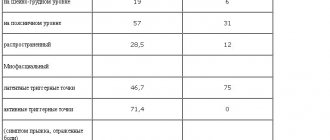Hypoglycemia
When taking sulfonylurea derivatives, including Diabetalong®, hypoglycemia may develop, in some cases in a severe and prolonged form, requiring hospitalization and intravenous administration of a dextrose solution for several days (see section “Side Effects”).
The drug can be prescribed only to those patients whose meals are regular and include breakfast. It is very important to maintain a sufficient intake of carbohydrates from food, as the risk of developing hypoglycemia increases with irregular or insufficient nutrition, as well as when consuming foods low in carbohydrates. Hypoglycemia is more likely to occur during a low-calorie diet, after prolonged or vigorous exercise, after drinking alcohol, or when taking multiple hypoglycemic medications at the same time.
Typically, symptoms of hypoglycemia go away after eating a meal rich in carbohydrates (such as sugar). It should be borne in mind that taking sweeteners does not help eliminate hypoglycemic symptoms. Experience with other sulfonylureas suggests that hypoglycemia may recur despite initial effective management of the condition. If hypoglycemic symptoms are pronounced or prolonged, even if the condition improves temporarily after eating a meal rich in carbohydrates, emergency medical care is necessary, including hospitalization.
To avoid the development of hypoglycemia, careful individual selection of drugs and dosage regimen is necessary, as well as providing the patient with complete information about the treatment being carried out.
An increased risk of hypoglycemia may occur in the following cases:
- Refusal or inability of the patient (especially the elderly) to follow the doctor’s orders and control their condition;
- Insufficient and irregular nutrition, skipping meals, fasting and changes in diet;
- Imbalance between physical activity and the amount of carbohydrates taken;
- Kidney failure;
- Severe liver failure;
- Overdose of Diabetalong®;
- Some endocrine disorders: thyroid diseases, pituitary and adrenal insufficiency;
- Concomitant use of certain medications (see section “Interaction with other medications”).
Kidney and liver failure
In patients with hepatic and/or severe renal impairment, the pharmacokinetic and/or pharmacodynamic properties of gliclazide may be altered. The state of hypoglycemia that develops in such patients can be quite long-lasting; in such cases, immediate appropriate therapy is necessary.
Patient Information
It is necessary to inform the patient, as well as his family members, about the risk of developing hypoglycemia, its symptoms and conditions that contribute to its development. The patient must be informed of the potential risks and benefits of the proposed treatment.
The patient must be explained the importance of diet, the need for regular exercise and monitoring blood glucose concentrations.
Insufficient glycemic control
Glycemic control in patients treated with hypoglycemic agents may be impaired in the following situations: fever, trauma, infectious diseases, or major surgery. In these conditions, it may be necessary to stop therapy with Diabetalong® and prescribe insulin therapy.
In many patients, the effectiveness of oral hypoglycemic agents, including Diabetalong®, tends to decrease after a long period of treatment. This effect may be due to both progression of the disease and a decrease in the therapeutic response to the drug. This phenomenon is known as secondary drug resistance, which must be distinguished from primary resistance, in which the drug does not give the expected clinical effect even at the first prescription. Before diagnosing secondary drug resistance in a patient, it is necessary to assess the adequacy of dose selection and the patient's compliance with the prescribed diet.
Laboratory tests
To assess glycemic control, regular determination of fasting blood glucose and glycosylated hemoglobin HbAlc is recommended. In addition, it is advisable to regularly self-monitor blood glucose concentrations.
Sulfonylureas may cause hemolytic anemia in patients with glucose-6-phosphate dehydrogenase deficiency. Since gliclazide is a sulfonylurea derivative, caution must be exercised when prescribing it to patients with glucose-6-phosphate dehydrogenase deficiency. The possibility of prescribing a hypoglycemic drug of another group should be assessed.
Impact on the ability to drive vehicles and machinery
Due to the possible development of hypoglycemia when using Diabetalong®, patients should be aware of the symptoms of hypoglycemia and should exercise caution when driving or performing work that requires a high rate of physical and mental reactions, especially at the beginning of therapy.
DIABETALONG
special instructions
Treatment with Gliclazide MB tablets is carried out only in combination with a low-calorie, low-carbohydrate diet.
It is necessary to regularly monitor blood glucose levels on an empty stomach and after meals, especially in the first days of treatment with the drug. Gliclazide MB tablets can only be prescribed to patients who receive a regular diet, which necessarily includes breakfast and ensures an adequate intake of carbohydrates.
When prescribing the drug, it should be taken into account that, as a result of taking sulfonylurea derivatives, hypoglycemia may develop, and in some cases in a severe and prolonged form, requiring hospitalization and glucose administration for several days. Hypoglycemia is more likely to occur during a low-calorie diet, after prolonged or vigorous exercise, after drinking alcohol, or while taking multiple hypoglycemic drugs at the same time.
To avoid the development of hypoglycemia, careful and individual selection of doses is necessary, as well as providing the patient with complete information about the proposed treatment.
In case of physical and emotional stress, when changing the diet, it is necessary to adjust the dose of Gliclazide MB tablets.
The following are especially sensitive to the effects of hypoglycemic drugs: elderly people; patients who do not receive a balanced diet, with a general weakened condition; patients suffering from pituitary-adrenal insufficiency.
Beta-blockers, clonidine, reserpine, guanethidine can mask the clinical manifestations of hypoglycemia.
Patients should be warned about the increased risk of hypoglycemia when taking ethanol, NSAIDs, or during fasting.
If you take ethanol (alcohol), it is also possible to develop disulfiram-like syndrome (abdominal pain, nausea, vomiting, headache).
Major surgical interventions and injuries, extensive burns, infectious diseases with febrile syndrome may require the abolition of oral hypoglycemic drugs and the prescription of insulin therapy.
The development of secondary drug resistance is possible (it must be distinguished from primary resistance, in which the drug does not give the expected clinical effect even at the first prescription).
During therapy with Gliclazide MB tablets, the patient must avoid drinking alcohol and/or drugs and foods containing ethanol.
During treatment with Gliclazide MB tablets, the patient must regularly determine the levels of glucose and glycosylated hemoglobin in the blood, and the glucose content in the urine.
During the treatment period, care must be taken when driving vehicles and engaging in other potentially hazardous activities that require increased concentration and speed of psychomotor reactions.



